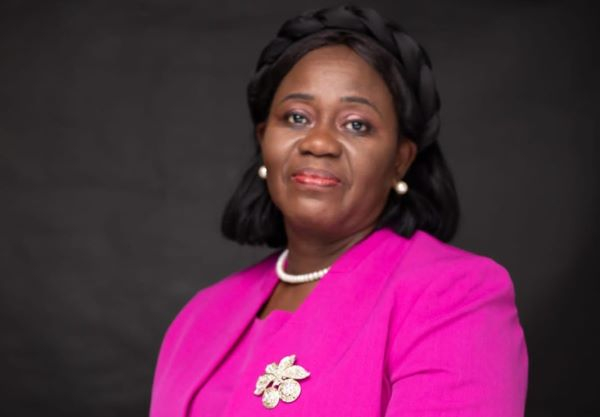GhanaWeb Feature by Mandy Agyemang
Suspended Chief Justice Gertrude Torkornoo has reacted to the empaneling of the five-member committee established by President John Dramani Mahama to investigate the petitions filed seeking her removal as Chief Justice.
Her response, outlined in a writ filed at the Supreme Court through her legal team, asserts that the Chairman of the committee, Justice Gabriel Scott Pwamang, and Justice Samuel Kwame Adibu-Asiedu are not qualified to serve as members of the committee investigating the petitions.
In her writ, Torkornoo argued that, based on a true and proper interpretation of specific provisions of the 1992 Constitution, namely Articles 23, 146(6) and (7), and 296(a) and (b), Justice Pwamang, who is named as the second defendant in the suit, is not qualified to chair the committee.
She justified this position by citing a conflict of interest, noting that Justice Pwamang had previously adjudicated and delivered rulings in favor of one of the petitioners seeking her removal from office.
“A declaration that upon a true and proper interpretation of articles 23, 146(6) and (7) and 296(a) and (b) of the Constitution, the 2nd defendant, Justice Gabriel Scott Pwamang, is not qualified to be a chairman or member of the committee set up by the President to inquire into the petitions against the Plaintiff on account of having adjudicated and given various rulings in favour of one of the petitioners, Daniel Ofori in actions filed in the Supreme Court,” portions of her writ filed on May 21, 2025 read.
Regarding Justice Samuel Kwame Adibu-Asiedu, the third defendant in the case, Torkornoo further argued, citing Articles 23, 7(1) and (2), 146(6) and (7), and 296(a) and (b) of the Constitution, that his appointment to the committee probing the petitions violates the principle of judicial independence.
In her writ, Torkornoo stated that at the time of Justice Adibu-Asiedu’s appointment to the committee, he had already been empanelled as a member of a Supreme Court panel to hear an application for an interlocutory injunction challenging proceedings under Article 146.
“A declaration that upon a true and proper interpretation of articles 23, 7(1) and (2), 146(6) and (7) and 296(a) and (b) of the Constitution, the appointment of the 3rd defendant, Justice Samuel Kwame Adibu-Asiedu, as a member of the committee set up by the President to inquire into the petitions against the Plaintiff, at a time when he had already sat as a member of a panel of the Supreme Court constituted under article 128(2) of the Constitution to hear an application for interlocutory injunction filed by a Ghanaian citizen challenging the “article 146 proceedings” initiated against the Plaintiff, violates the independence of the Judiciary,” her writ indicated.
Based on this, Torkornoo maintains that Justices Pwamang and Adibu-Asiedu are not qualified to serve on the committee and is therefore seeking their removal.
Justice Torkornoo’s main argument was based on Articles 23, 7(1) and (2), 146(6) and (7), and 296(a) and (b). Here is what the constitution says;
Article 23
Under the 1992 Constitution, Article 23 which highlights administrative justice says, “Administrative bodies and administrative officials shall act fairly and reasonably and comply with the requirements imposed on them by law and persons aggrieved by the exercise of such acts and decisions shall have the right to seek redress before a court or other tribunal.”
Article 7 clause (1) and (2)
Article 7 addresses the issue of persons entitled to be registered as citizens, which says in clause (1) that, “A woman married to a man who is a citizen of Ghana or a man married to a woman who is a citizen of Ghana may, upon making an application in the manner prescribed by Parliament, be registered as a citizen of Ghana.”
Article 7(2) also states, “Clause (1) of this article applies also to a person who was married to a person who, but for his or her death, would have continued to be a citizen of Ghana under clause (1) of article 6 of this Constitution.”
Article 146 clause (6) and (7)
Article 146 of the 1992 Constitution outlines the process of the removal of Justices of Superior Courts and Chairmen of Regional Tribunals.
Under Article 146 (6), it states that, “Where the petition is for the removal of the Chief Justice, the President shall, acting in consultation with the Council of State, appoint a committee consisting of two Justices of the Supreme Court, one of whom shall be appointed chairman by the President, and three other persons who are not members of the Council of State, nor members of Parliament, nor lawyers.”
Article 146 (7) also states that, “The committee appointed under clause (6) of this article shall inquire into the petition and recommend to the President whether the Chief Justice ought to be removed from office.”
Article 296 clause (a) and (b)
Article 296 of the Constitution focuses on the exercise of discretionary powers.
Under 296, it says that where in this Constitution or in any other law discretionary power is vested in any person or authority;
(a) That discretionary power shall be deemed to imply a duty to be fair and candid;
(b) The exercise of the discretionary power shall not be arbitrary, capricious or biased either by resentment, prejudice, or personal dislike and shall be in accordance with due process of law.
Based on these provisions as explicitly enshrined in the 1992 Constitution, does the embattled CJ have a case?
MAG/MA
After the heavy rains over the weekend, a lot of debris have been left across many parts of Accra. Watch some of the destructions below:
